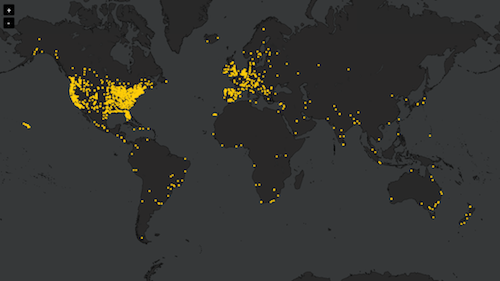
The Occupy Movement is one year old, so let us take a look at its accomplishments.
The movement emerged out of the coalescing of right and left wing populisms, angry over the economic and political system that pervades the United States. Its signature event was the camp-in and protests around Zuccotti Park in the Wall Street neighbourhood of New York City. While distinctly American in origin, the message resonated with millions, and led to various other occupy movements in cities around the world. Most of these were concentrated in North American and European cities, followed by major urban areas in the rest of the world.
The movement was initially dismissed by business elites, the mainstream media, political pundits and politicians because it lacked a unitary organization and was not promoting a recognizable slate of legislative demands. This represented the blinkered view of many that politics and policy are about government action, and that material interests (in this case of the marginalized 99%) account for political activity. This was wrong on two accounts.
First, while the policy message was sometimes obtuse, the moral critique was honed and sharp. Whether right or left, Occupy vociferously objected to the undeserved and privileged standing of the 1% percent, as well as a neo-liberal political-economic system rigged for the benefit of plutocrats, not the well-being of the community as a whole.
In terms of ethics and public policy, Occupy critiqued many things — undermining the safety net for the poor, burdening the middle-class with increased taxes and fewer government services, a lack of investment in the nations infrastructure, falling investment in education and research, transferring wealth via the tax code and economic policy from the poor and middle-class to a wealthy elite, the political corruption that great concentrations of wealth creates, the corporate agenda of the Republican Party and the Supreme Court of the US, the neoliberal globalization of the Democratic Party, failures in animal welfare and environmental protection, and the decades-long toll all this takes on women, children, the poor, labour, and the middle class.
It is not as simply as even this list portrays. There are other issues, and shifting alliances and tensions between their advocates. But this list give an inkling as to the breadth of Occupys moral exegesis.
That the news media could not initially appreciate the moral coherence of this critique, and were thus confused by the range of policy issues addressed, spoke poorly about the moral-political engagement of mainstream journalism, not Occupy itself.
Second, policy is never simply about government actions or material interests. Policy is always the outcome of an intersection of both values and interests, articulated and promoted though pressure groups and government. To artificially focus on only one dimension of this complex dynamic is to dumb down our understanding of public policy.
The values dimension is well illustrated by the Occupy Movement itself, which created a broad coalition of shared moral values (e.g., liberty, equality, solidarity, fairness, community responsibility) that transcended different experiences, issues commitments, life ways, and political ideologies.
Occupy also illustrates the direct role that grass roots pressure groups have on the policy process. It changed the course of public debate away from simplistic and regressive austerity politics, and towards questions of how our economic and political system can ensure a fair and just society.
This is not to dismiss the reality or importance of government and its policies. It is rather highlighting how policy emerges out of governance more broadly understood. That is, how civil society and government institutions interact to generate public polices with roots not just in material interests, but in moral values as well.
You can learn more about Occupy by visiting Occupy.Net. For more on the role that social movements have in policy making, the best place to start is Bill Moyers book, Doing Democracy (2001). There are a set of websites that incorporate his model of social activism, simply search doing democracy.
Image: World map from Occupy Directory.